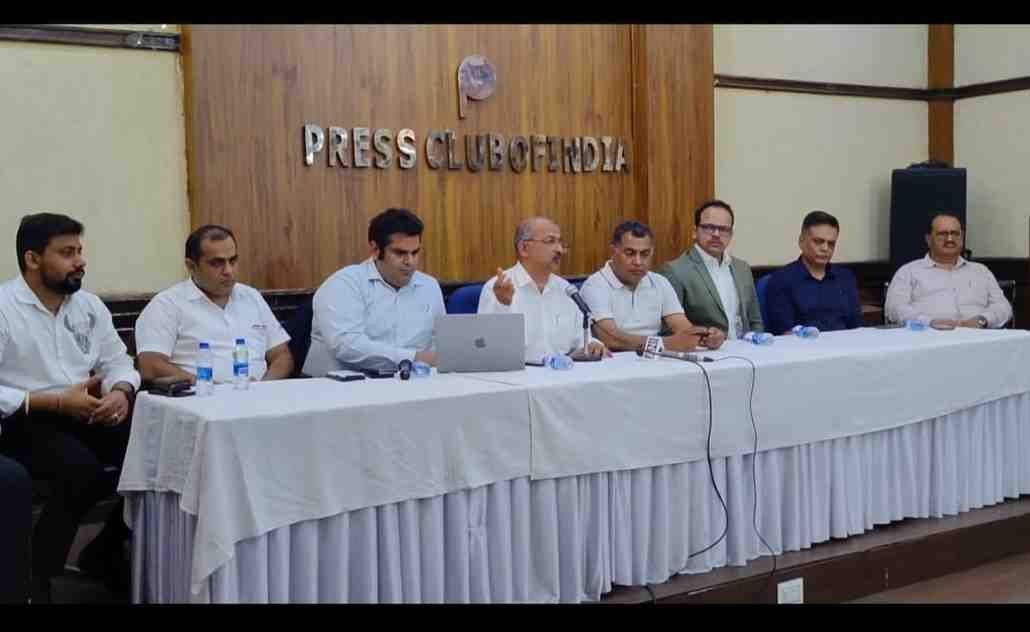New Delhi: The Society of Electric Vehicle Manufacturers (EVMS), a national body representing over 200 organised and MSME electric vehicle manufacturers, sounded the alarm on Thursday over the proliferation of illegal e-rickshaws and the influx of substandard imported components, which they say are threatening the safety, credibility, and long-term sustainability of India’s electric mobility sector.
Addressing a press conference at the Press Club of India, EVMS General Secretary Shri Rajiv Tuli—an industry veteran with over 25 years of experience—called for immediate and coordinated policy action. He highlighted the urgent need for regulatory clarity, stricter enforcement, and a unified effort among stakeholders to safeguard public safety and ensure the integrity of India’s e-mobility ecosystem.
E-Rickshaws: Backbone of Green Mobility
India’s e-rickshaw sector has rapidly grown into a crucial pillar of sustainable urban and rural transport. With over 50 lakh e-rickshaws currently operating nationwide, the industry has become instrumental in reducing carbon emissions and offering last-mile connectivity. According to EVMS, the sector helps cut carbon emissions by around 4 lakh metric tons annually—equivalent to the environmental benefit of planting two billion trees. E-rickshaws are also credited with replacing 98% of traditional mechanical rickshaws, saving approximately 50 million litres of petrol daily and easing the pressure on fuel imports.
Economically, the sector has proven to be a major job creator. Over 50 lakh individuals are directly employed, while another 75 lakh are indirectly engaged, particularly in small towns and rural regions. For economically weaker sections, e-rickshaws offer a source of stable income, and their adaptability has made them the preferred mode of transport in metros and smaller towns alike.
Legal vs. Illegal E-Rickshaws
Despite these benefits, EVMS expressed grave concerns over the unregulated expansion of illegal e-rickshaws, which operate without following the required safety and regulatory norms. Tuli explained that confusion and misconceptions about e-rickshaw safety are largely due to the presence of unregistered and non-compliant vehicles, which continue to flood the streets.
“A legal e-rickshaw is one that possesses proper registration, a number plate, chassis number, insurance, and a valid fitness certificate. These vehicles are built with certified OEM parts and undergo rigorous testing by authorised agencies,” said Tuli.
In contrast, illegal e-rickshaws lack these credentials. Many are converted pedal rickshaws or assembled from untested, substandard parts. They do not comply with safety norms, have no insurance or certification, and pose a significant risk to public safety. According to EVMS estimates, nearly 4.75 lakh of these unauthorized e-rickshaws are currently operating in various cities without proper registration, driver certification, or QR codes.
The association also pointed to procedural delays, such as in the issuance of vehicle identification codes (VICs) and the absence of a streamlined registration process, which enable these vehicles to continue operating unchecked.
Low-Quality Imports Hurting Industry
Another major issue raised during the press conference was the surge in imports of low-grade electric vehicle components, particularly motors and controllers. Between 2021 and 2024, motor imports shot up from ₹320 crore to ₹870 crore, while controller imports increased from ₹140 crore to ₹410 crore. A significant portion of these parts, especially those from China, reportedly fail to meet Indian quality and safety standards.
“These imports are severely impacting vehicle performance and putting passenger safety at risk,” said Tuli, adding that domestic MSME component manufacturers have lost about 35% of their market share due to this influx. He labelled the trend as a direct threat to the government’s ‘Aatmanirbhar Bharat’ initiative and a blow to indigenous innovation.
Enforcement Gaps and Legal Loopholes
EVMS also highlighted critical gaps in the enforcement mechanism. These include the lack of adequate infrastructure to seize and dismantle illegal vehicles, and the absence of a clear policy for scrapping old and unfit e-rickshaws. The organisation presented a comprehensive dossier containing RTI replies, Ministry of Road Transport and Highways notifications, Delhi High Court directives, and circulars from the Delhi Transport Department to back its claims.
In addition, the association shared district-wise data on hotspots of illegal e-rickshaw operations and statistics illustrating how the unregulated imports are weakening domestic manufacturing capabilities. A comparative chart underscored the growing mismatch between compliant manufacturing and the influx of uncertified, low-quality imports.
Call for Decisive Action
Concluding the press briefing, Shri Tuli reiterated the need for strong, enforceable policies. “This new era of electric mobility will not thrive if quality is compromised, safety is ignored, and the future remains uncertain. To build a reliable, competitive, and safe EV industry, we must enforce existing laws, ensure public safety, and empower our domestic manufacturers,” he said.
Tuli called upon central and state authorities to crack down on illegal operators, streamline the registration and compliance process, and support the growth of indigenous manufacturers. Without immediate intervention, he warned, the credibility of the entire e-rickshaw sector could be undermined.
As India moves towards a greener future, the concerns raised by EVMS underline the importance of balancing rapid growth with strict regulatory oversight—ensuring that progress in clean transport does not come at the cost of safety, quality, or domestic innovation.








